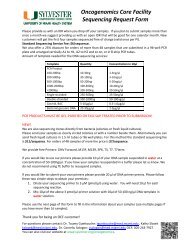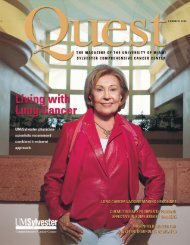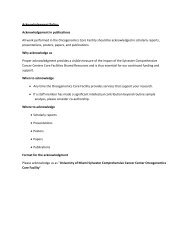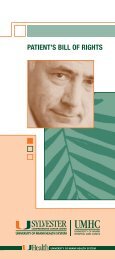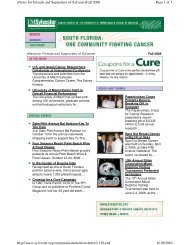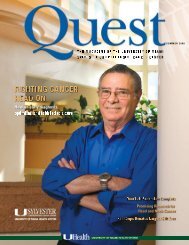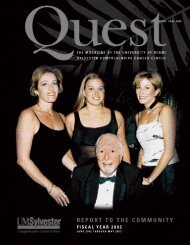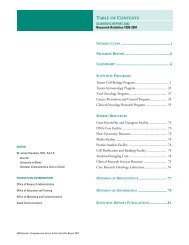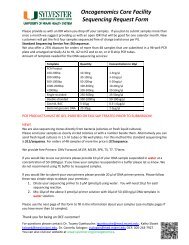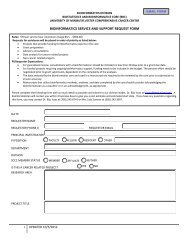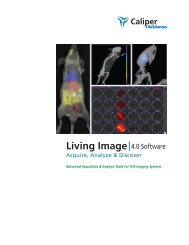SCIENTIFIC REPORT 2004 - Sylvester Comprehensive Cancer Center
SCIENTIFIC REPORT 2004 - Sylvester Comprehensive Cancer Center
SCIENTIFIC REPORT 2004 - Sylvester Comprehensive Cancer Center
You also want an ePaper? Increase the reach of your titles
YUMPU automatically turns print PDFs into web optimized ePapers that Google loves.
C A N C E R P R E V E N T I O N A N D C O N T R O L P R O G R A M<br />
MICHAEL H. ANTONI, PH.D.<br />
Professor of Psychology<br />
DESCRIPTION OF RESEARCH<br />
Dr. Antoni’s research interests over the past<br />
decade have focused on examining the effects<br />
of stressors and stress management interventions<br />
on the adjustment to, and physical course<br />
of, diseases such as breast cancer, cervical cancer,<br />
prostate cancer, chronic fatigue syndrome, and<br />
HIV infection. He also has examined some of the<br />
psychobiological mechanisms that might explain<br />
ways in which stressful events and psychosocial<br />
interventions contribute to the adjustment to,<br />
and physical course of, these diseases looking specifically<br />
at psychological intervening variables<br />
(stress appraisal processes, coping behaviors, and<br />
social resources) and biological/physiological variables<br />
(endocrine and immune system functioning).<br />
For the past four years, Dr. Antoni has been<br />
funded by the NCI through a five-year P50 <strong>Center</strong><br />
for Psycho-Oncology Research (CPOR) grant,<br />
which conducts bio-psychosocial research on the<br />
inter-relationships between cognition, emotions,<br />
biological processes, and physical health in the<br />
context of several cognitive-behavioral stress<br />
management (CBSM) randomized clinical trials.<br />
Populations include those at high risk for cancer<br />
and those dealing with cancer diagnoses including<br />
cervical neoplasia, breast cancer, and prostate<br />
cancer. The grant includes funding for four clinical<br />
trials, five core laboratories dedicated to providing<br />
psychosocial and biological mechanism<br />
and outcome data, as well as statistical/data management<br />
for the four clinical trials. A number of<br />
UM/<strong>Sylvester</strong> investigators including those from<br />
the departments of Microbiology and Immunology,<br />
Psychology, and Medicine, have ongoing<br />
pilot studies designed to elaborate on biopsychosocial<br />
pathways being explored in the<br />
CPOR parent trials.<br />
Generally speaking, most of Dr. Antoni’s research<br />
efforts have focused on using information<br />
derived from studies examining the effects of field<br />
and laboratory stressors to develop stress reduction<br />
interventions that are specifically tailored to<br />
the disease-related issues, educational levels, and<br />
cultural characteristics of the target groups. This<br />
has resulted in the development of treatment<br />
manuals used for conducting intervention<br />
groups, which are in turn used to test the efficacy<br />
of treatment programs in the context of randomized<br />
clinical trials. In addition to testing the efficacy<br />
of these interventions in homogeneous<br />
populations, this program also will conduct<br />
generalizability studies designed to see how well<br />
the interventions work in diverse patients groups<br />
(e.g., inner city HIV+ women at risk for cervical<br />
cancer and Spanish-speaking breast cancer patients).<br />
The overarching goal is to develop theoretically<br />
driven and empirically supported<br />
psychosocial interventions with utility for secondary<br />
and tertiary prevention in persons diagnosed<br />
and treated for cancer.<br />
SELECTED PUBLICATIONS<br />
2002<br />
Antoni, MH, Cruess, DG, Klimas, N, Maher, K,<br />
Cruess, S, Kumar, M, Lutgendorf, S, Ironson, G,<br />
Schneiderman, N, and Fletcher, MA. Stress management<br />
and immune system reconstitution in<br />
symptomatic HIV-infected gay men over time:<br />
effects on transitional naïve T cells<br />
(CD4(+)CD45RA(+)CD29(+)). American Journal<br />
of Psychiatry 159:143-45, 2002.<br />
Knippels, HM, Goodkin, K, Weiss, JJ, Wilkie,<br />
FL, and Antoni, MH. The importance of cognitive<br />
self-report in early HIV-1 infection: validation<br />
of a cognitive functional status subscale.<br />
AIDS 16:259-67, 2002.<br />
Culver, JL, Arena, PL, Antoni, MH, and Carver,<br />
CS. Coping and distress among women under<br />
treatment for early stage breast cancer: comparing<br />
African Americans, Hispanics and non-Hispanic<br />
Whites. Psycho-oncology 11:495-504, 2002.<br />
4<br />
UM/<strong>Sylvester</strong> <strong>Comprehensive</strong> <strong>Cancer</strong> <strong>Center</strong> Scientific Report <strong>2004</strong>




